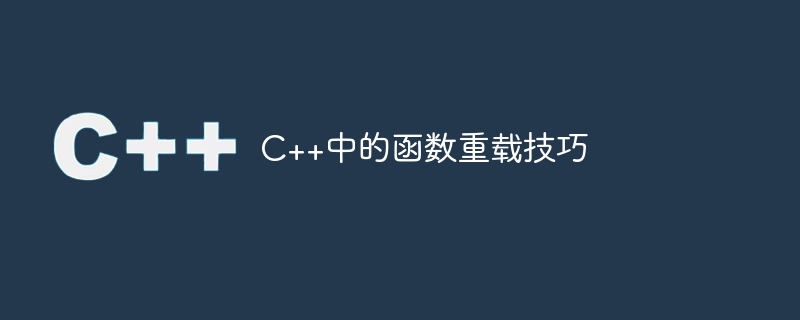Home >Backend Development >C++ >Function overloading techniques in C++
Function overloading techniques in C++
- PHPzOriginal
- 2023-08-22 12:09:221542browse

Function overloading in C is a very powerful feature. Function overloading means that in the same scope, we can define multiple functions with the same name, but their parameter lists are different. When we call these functions with the same name, the compiler will automatically choose which function to call based on the number and type of parameters passed in. This allows us to write more concise, readable and maintainable code. The following are some function overloading techniques in C:
- Different parameter types
We can define multiple functions with the same name, but their formal parameter types are different. For example:
int add(int a, int b); double add(double a, double b);
The above two functions are both called add, but one receives a parameter of type int and the other receives a parameter of type double. When we call the add function, the compiler will automatically match the corresponding function based on the type of the passed parameters.
- The number of parameters is different
We can define multiple functions with the same name, but their number of parameters is different. For example:
int sum(int a, int b); int sum(int a, int b, int c); int sum(int a, int b, int c, int d);
The above three functions are all called sum, but their number of parameters is different. When we call the sum function, the compiler will automatically match the corresponding function based on the number of parameters passed in.
- Different parameter types and numbers
We can define multiple functions with the same name, and their parameter types and numbers are different. For example:
int max(int a, int b); double max(double a, double b); int max(int a, int b, int c); double max(double a, double b, double c);
The above four functions are all called max, and their parameter types and numbers are different. When we call the max function, the compiler will automatically match the corresponding function based on the type and number of parameters passed in.
- Parameter default values
We can define a function with default values for some of its parameters. For example:
int sum(int a, int b, int c = 0);
The above sum function accepts three parameters, but the last parameter has a default value of 0. If we only pass in two parameters when we call the sum function, the third parameter will be automatically assigned a value of 0. If three parameters are passed in, the value of the third parameter is the value passed in.
- const keyword
We can define two functions with the same name, one that accepts const type parameters and the other that does not. For example:
int sum(const int a, const int b); int sum(int a, int b);
The above two functions are called sum, but the first one receives a const type parameter. In this case, if we pass in a const type parameter when calling the sum function, the first function will be called; if we pass in a non-const type parameter, the second function will be called.
When using function overloading, we need to pay attention to the following points:
- Functions with the same name must be defined in the same scope.
- The formal parameter list of the function must be different, including the number, type, order or default parameter values of the parameters.
- The return type cannot be used as a distinguishing mark for function overloading.
- Do not overuse function overloading, otherwise it will reduce code readability and maintainability.
In short, function overloading is a very useful feature in C, which allows us to write more concise, readable and maintainable code. We can flexibly use different overloading methods according to actual conditions to better meet project needs.
The above is the detailed content of Function overloading techniques in C++. For more information, please follow other related articles on the PHP Chinese website!

